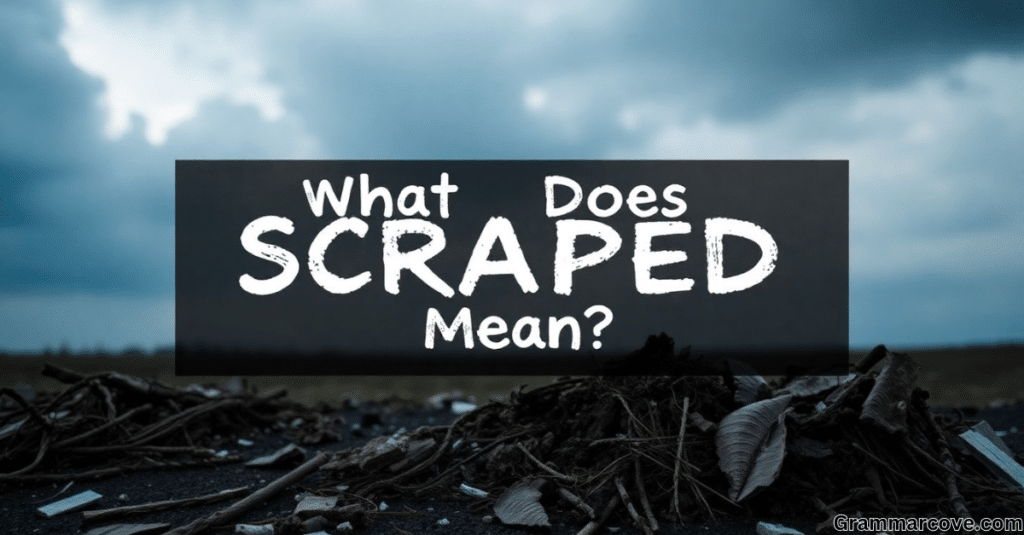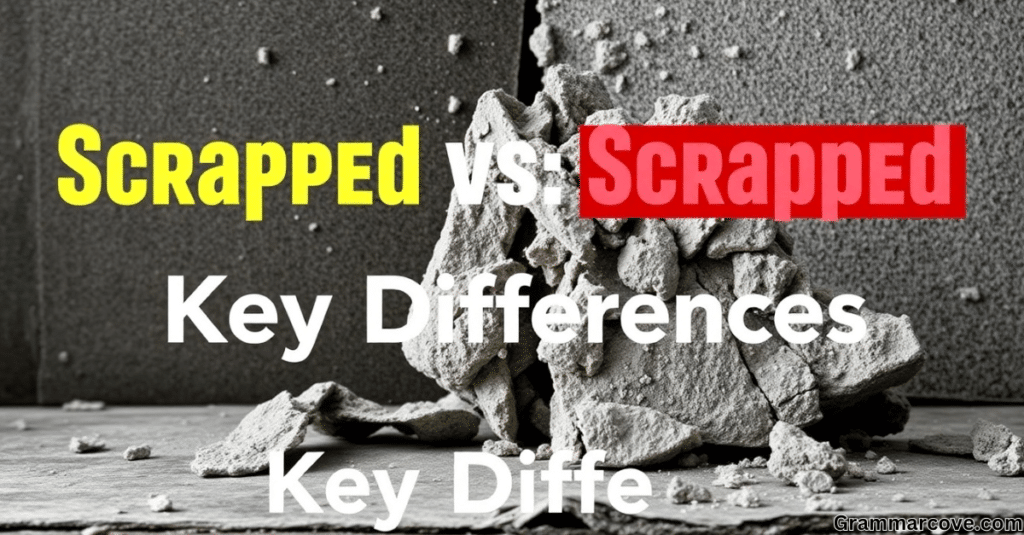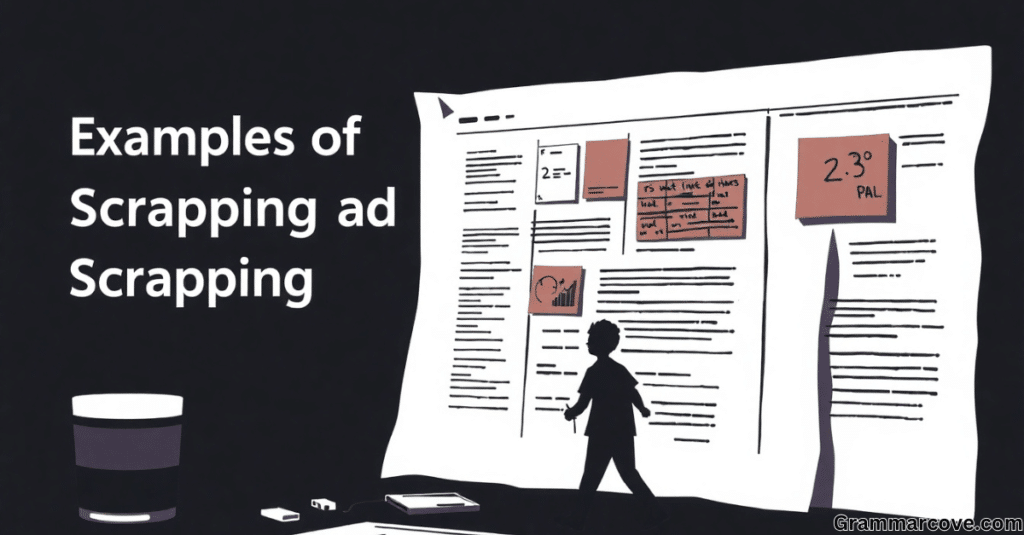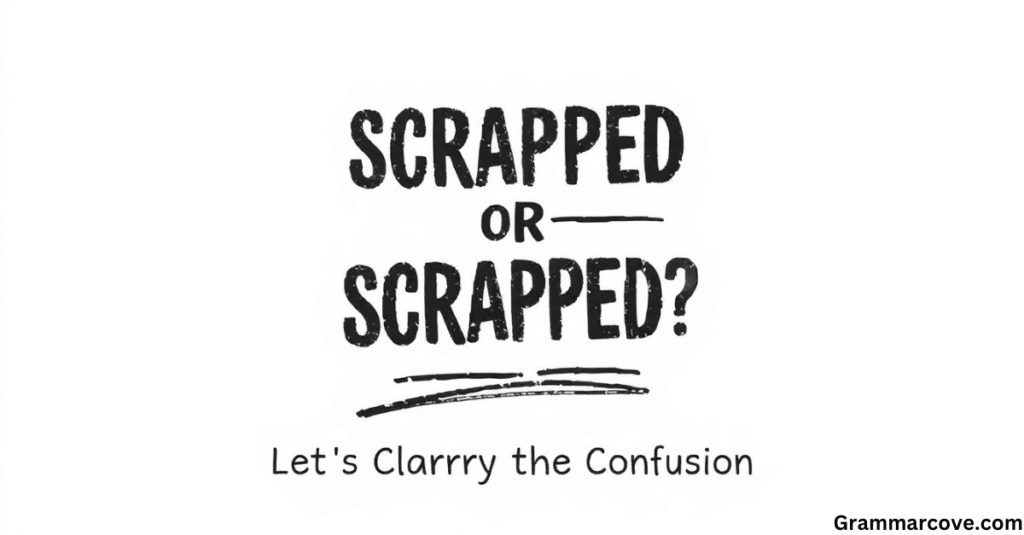In the English language, homophones—words that sound alike but have different meanings—can often trip us up. “Scrapped” and “scraped” are two words that fall into this category. At first glance, they may seem almost identical, but they are distinct both in their meaning and their use. So, how do you know which one to use? In this article, we’ll break down the difference between scrapped and scraped, explain their origins, provide real-life examples, and clarify their figurative and literal uses.
What Does Scrapped Mean?
Let’s start with scrapped. The word scrapped is the past tense of scrap, and it generally refers to discarding, abandoning, or canceling something. You’ll often hear scrapped used in the context of plans, ideas, projects, or things that are no longer considered useful. It carries a figurative meaning and is frequently used in both business and casual conversations.
Scrapped Definition
To scrap something means to get rid of it, either because it is no longer needed, useful, or viable. The definition of scrapped thus implies that something has been abandoned or discarded.
Scrapped Examples:
- The company scrapped its plans for a new product launch after market research revealed low demand.
- “They scrapped the event because of a forecasted thunderstorm.”
As seen above, scrapping can refer to abandoning a project, canceling an event, or simply deciding that something is no longer worth pursuing.
Origins of Scrapped
The etymology of scrapped comes from the word “scrap”, which originally referred to small pieces or fragments. Over time, scrap evolved to mean waste or discard. The word is now used in a variety of contexts, from scrapping an idea to scrapping old vehicles. When something is scrapped, it’s as if it has been reduced to waste or something that no longer serves its original purpose.
What Does Scraped Mean?

Now, let’s talk about scraped. The word scraped is the past tense of scrape, and it refers to the physical action of scraping—meaning to remove material from a surface, often using a tool like a knife, razor, or brush. This can refer to cleaning or scraping off layers of material, whether it be dirt, paint, ice, or any other substance that clings to a surface.
Scraped Definition
To scrape means to remove something from a surface by rubbing or scratching it with a tool. The definition of scraped generally implies that a physical action was taken to remove material, often with effort.
Scraped Examples:
- “She scraped the ice off her windshield before driving.”
- “The artist scraped off the paint to reveal the original texture of the canvas.”
These examples involve physical actions of scraping—whether it’s cleaning surfaces or removing layers of material.
Origins of Scraped
The word scrape comes from the Old French word “escraper”, which means to scratch, scuff, or rub. Over time, the action of scraping became associated with cleaning or removing material from a surface, and it has remained a common term for activities involving the physical removal of substances.
Scrapped vs Scraped: Key Differences

Although these two words sound quite similar, the differences in context are key. Here’s a breakdown of scrapped vs scraped:
| Aspect | Scrapped | Scraped |
|---|---|---|
| Meaning | Discarded, abandoned, or canceled. | Physically removed material from a surface. |
| Use | Refers to projects, plans, or ideas that are no longer needed. | Refers to cleaning, scratching, or removing layers. |
| Context | Often figurative (plans, projects). | Often literal (physical action). |
| Example 1 | “The meeting was scrapped due to unforeseen circumstances.” | “He scraped the last of the frosting from the bowl.” |
| Example 2 | “They scrapped the expansion project.” | “She scraped the ice off the windshield.” |
Contextual Use of Scrapped
The word scrapped often refers to the cancellation or abandonment of plans or projects. It suggests that something is no longer necessary or useful. Examples of scrapped in real life might include decisions to stop pursuing certain business strategies, personal plans, or other ventures.
- “After months of deliberation, the team scrapped the idea of opening a new office in Europe.”
- “The city scrapped the construction project after the budget ran over.”
In these cases, scrapped is used in a figurative sense to indicate cancellation or abandonment.
Contextual Use of Scraped
In contrast, scraped typically refers to a physical action. You can think of it as an action that requires effort to remove something from a surface. This could be something as simple as cleaning or removing material like paint, dirt, or ice.
- “She scraped the mud off her boots before entering the house.”
- “He scraped the burnt food from the bottom of the pan.”
In these examples, scraped refers to the physical removal of layers or unwanted material.
Synonyms for Scrapped
To help diversify your vocabulary, here are some synonym alternatives for scrapped:
- Abandoned
- Discarded
- Rejected
- Canceled
- Thrown away
Each of these words can be used in place of scrapped when referring to something that has been rejected or no longer pursued. For example:
- “After much discussion, the board abandoned the proposal.”
- “The product line was discarded due to lack of interest.”
Synonyms for Scraped
Similarly, here are some synonym alternatives for scraped:
- Scratched
- Scuffed
- Rasped
- Rubbed off
- Abraded
These words focus more on the physical aspect of removing material. For instance:
- “She scratched the paint off the old door.”
- “He rubbed off the excess dirt from his shoes.”
Examples of Scrapping and Scraping in Different Contexts

Let’s explore some real-world examples of scrapped vs scraped in context:
Scrapped Examples
- Email Example (Scrapped Project)
Subject: Decision to Scrap the Project
Hi Emily,
After a lengthy review, we’ve decided to scrap the new product line. The market conditions aren’t as favorable as we hoped, and the resources required to continue aren’t feasible. Let’s regroup and look at other potential products we could launch next quarter.
Regards,
Mark - Business Context (Scrapping a Plan)
The company scrapped its initial plan to expand into the international market after unforeseen economic challenges and limited resources became clear.
Scraped Examples
- Email Example (Cleaning Task)
Subject: Progress on Warehouse Cleanup
Hi James,
We’ve made great progress on the warehouse cleanup. We’ve already scraped the majority of the grime from the walls and are now focusing on the floors. Hopefully, we can complete the task by the end of the week.
Best,
Laura - Physical Context (Scraping Ice)
Sarah scraped off the frost from her car windows early in the morning, allowing her to see clearly before driving to work.
The Past Tense of Scrap and Scrape
Understanding the past tense of both verbs can also help clear up any confusion:
- The past tense of scrap is scrapped. Example: “They scrapped the new software development project.”
- The past tense of scrape is scraped. Example: “He scraped the mud off his boots before walking inside.”
Cleaning Surfaces and Scraping Off Layers
One area where scraping is frequently used is in the cleaning and removal of unwanted layers. This can be literal (removing dirt, paint, or food) or figurative (overcoming obstacles or achieving a small goal).
Examples of Scraping Off Layers:
- “They scraped the rust off the metal before repainting it.”
- “He carefully scraped the glue off the table after finishing his arts and crafts project.”
In these cases, scraping focuses on removing something physically attached to a surface.
Final Thoughts: Scrapped or Scraped?
So, what’s the takeaway here? The next time you’re unsure about whether to use scrapped or scraped, remember that the context of the word will guide you:
- Use scrapped when referring to discarding, canceling, or abandoning something.
- Use scraped when describing the physical act of removing material from a surface.
Whether you’re making decisions about a project, cleaning your car, or cleaning paint off a wall, understanding the correct usage of these two words can ensure that your communication is clear and precise.
By following these simple guidelines and keeping these distinctions in mind, you’ll always know whether to use scrapped or scraped.


